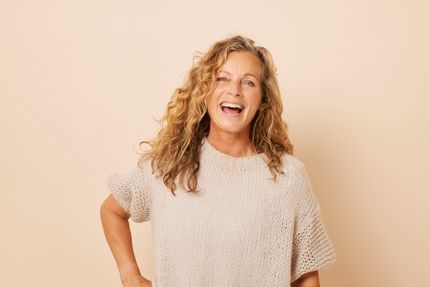

Marieke (age 46): “My sudden insomnia was making it hard to function at work”
Marieke is 46 years old and works as a secondary school principal. She loves the fact that her job is dynamic. It's what makes it so interesting. Even though her job is quite demanding and hectic, she always found it extremely rewarding. Until, out of nowhere, she started having sleep problems. “Not getting enough sleep made it hard to function at work. I was constantly making careless mistakes and became increasingly irritable with colleagues and students.”
“I was always able to get eight hours of sleep easily"
Marieke never had any problems with sleeping until six months ago. It started with waking up more than usual and progressed to tossing and turning for hours. “No matter how tired I was, I struggled to fall asleep every night. When the alarm clock went off, I felt even more tired than before going to bed,” she says frankly.
Her insomnia was making it more and more difficult to function at work. “I was making mistakes that I would normally never make and became increasingly irritable with colleagues and students. I didn’t feel like myself anymore and knew I had to do something. My job requires me to be alert, but also understanding and kind.”
Vicious cycle of poor sleep
The school director explored solutions to tackle her insomnia. “I tried everything, from calming tea and hot baths to shutting down screens before bedtime. I even tried meditating, but nothing seemed to work.”
Although meditation has become a daily habit, it didn't resolve her sleep issues. “I was very concerned about the impact of all those sleepless nights on my health. I got caught in a vicious circle: I was afraid to go to bed because I’d worry about waking up in the middle of the night. This got me so anxious that it kept me from falling asleep as well.”
The penny dropped
Then a friend mentioned a menopause specialist. Marieke wasn’t convinced, but made an appointment anyway. “During the intake appointment, the penny dropped: I was perimenopausal. I thought I had years to go before I had to worry about menopause, so I hadn't made the link. What's more, my periods were still regular. Menopause was the last thing on my mind.”
What was the specialist's advice? First, she wanted Marieke to look at her diet. “Nutrition, and how your food is digested, plays a big role in how you sleep,” she told me. “I had been struggling with my diet for several years, but I hadn't really made a conscious effort to change it.”

I discovered that the body’s needs change as you go through menopause. I needed to adjust my diet accordingly.

The adrenal glands
“I also learned that as women age, the adrenal glands play an increasingly important role in our health. So we also talked about what I could do to keep my adrenal glands healthy,” Marieke continues. “She advised me to take supplements. I have been doing this every day for about five months now and the benefits are starting to show.”
What are the effects of the adjustments Marieke has made? “I have noticed that my digestion has improved and I also feel stronger physically. But the main way in which my life has changed is that I sleep much better. I started waking up less, and now I manage to sleep through more and more nights. I feel so much better, it's like I've found myself again.”

Of course, bad days still happen sometimes, but they're easier to navigate now.

Personal experiences











